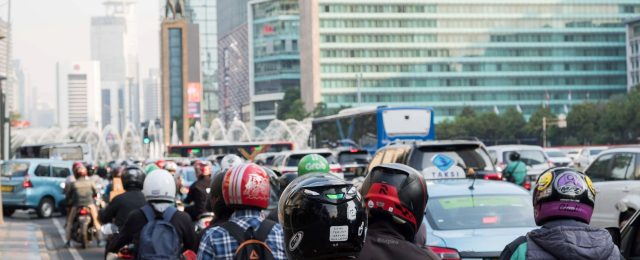A glimpse at our Urban Benchmark

About 55% of the world’s population already live in cities. This is estimated to grow to 70% by 2030, with most of that growth happening in Asia and Africa. Cities also contribute substantially to climate change. They are where 78% of the world’s energy are consumed, and where 60% of the world’s greenhouse gases are produced. At the same time, cities are disproportionally impacted by climate change and extreme weather events, requiring significant investments in enhancing safety and resilience.
This is why we need to urgently transform our global urban system: to make it more accessible to everyone, and ensure it plays a more active role in reducing emissions and preventing climate change. The World Benchmarking Alliance (WBA) has started developing a methodology for benchmarking the world’s most socially and environmentally impactful companies on their contribution to transforming our global urban system. During our Allies Assembly in Cape Town earlier this month, we held a roundtable to obtain input from key regional stakeholders and urban experts on urban development. The session was a deliberate effort to ensure that the development of the methodology was done in a participatory manner and considers views from various regions of the world.
The Benchmark
WBA’s Urban Benchmark will measure the world’s keystone companies on their contribution to Sustainable Development Goal (SDG) 11 ‘’to make cities and human settlements inclusive, safe, resilient, and sustainable’’. This benchmark will build and expand on existing benchmarks and rankings associated with SDG 11, which typically measure and compare the performance of cities, governments, and projects. WBA intends to assess 300–400 of the world’s most influential companies operating in property development and management, urban planning and design, construction and building materials, urban transportation and logistics, and urban utilities and infrastructure.
Aspects that they identified included: uplifting people’s lives, ensuring the right to livelihood and housing, safety, resilience, equal enjoyment of utilities and amenities, and respect for local communities’ land rights and institutions.
The roundtable
The roundtable participants were an insightful group of practitioners and stakeholders who dedicated their thoughts and energy to discussing a zero draft of the urban research framework. They included representatives from the South African Council of Planners, the Green Building Council, Save the Children, the Saartjie Baartman Centre for Women and Children, as well as architects, urban designers, university professors, and municipal planners. One of our Allies – Africa Monitor – also attended, as did an Asia-based conglomerate that may be assessed by the Benchmark (Metro Pacific Investment Corporation).

During the session, participants reviewed various urban-specific SDG indicators relevant to companies. They identified common topics that appear repeatedly, including housing, transport, urban planning, disaster preparedness, heritage conservation, power, water, waste management, green spaces, land tenure, migration, and gender empowerment.
The roundtable also highlighted some basic prerequisites to SDG 11 that may be taken for granted in some countries: safety and security. Without these, it may be a challenge to achieve the principles of an inclusive city, where everyone from all social and economic backgrounds are welcome to live, work, and play in the city. Finally, each participant shared their own version of a framework for the private sector’s contribution to an urban system transformation. Some of the aspects that they identified included: uplifting people’s lives, ensuring the right to livelihood and housing, safety, resilience, equal enjoyment of utilities and amenities, and respect for local communities’ land rights and institutions.
Next steps
At WBA, we believe that the urban system is one of the seven systems that needs to be transformed to achieve truly socially inclusive and environmentally sustainable economies and societies, as laid out in our report, ‘Measuring what matters most’. Sustainable urbanisation faces a scale of challenges; this requires the private sector to work in tandem with local and national governments and community organisations.
Our methodology for the Urban Benchmark will provide the first-ever comprehensive roadmap for the private sector on how they can contribute to sustainable urbanisation. WBA intends to publish a draft framework ready by the end of 2022. This will be followed by multi-stakeholder consultations, data collection and research, and publication of the first benchmark results.
Want to know more or get involved? Please contact: